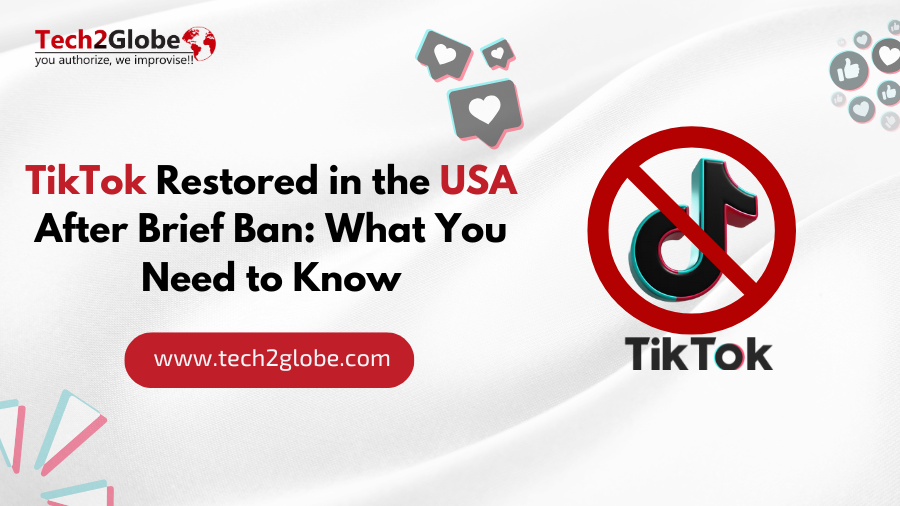Summary: The TikTok ban in the U.S. has not been confirmed yet, but it has also not been restored. What does the 75-day delay ordered by Trump actually mean? Here, we cover the full story behind the recent TikTok ban in the U.S.
On January 18, 2025 the Supreme Court ordered that TikTok must balance national security matters or face sale termination. As the ban threat grew Google and Apple took TikTok off their app markets until they could resume serving US users. However, the new order gives stakeholders more time to negotiate and work toward a resolution, with the possibility of a sale to US-based entities on the table.
The app’s current US status remains unclear even though it has received relief for now. The app’s fate will remain insecure until both parties resolve their issues within 75 days.
Tik Tok Ban in the United States
Late Saturday night, TikTok users in the U.S. were hit with a surprising issue: instead of the usual video feed, a pop-up message appeared. It explained that a new law had banned TikTok and mentioned, “President Trump has indicated he will work with us on a solution to reinstate TikTok once he takes office.” The message ended with a hopeful, “Please stay tuned!”
But by Sunday afternoon, TikTok was back up and running.
The company then released a statement, thanking President Trump for assuring service providers that they wouldn’t face penalties for supporting TikTok. Essentially, the law targets companies like Apple, Google, and Oracle, penalizing them for distributing or updating TikTok content.
Reasons for the TikTok Ban in the U.S.
TikTok, one of the most popular apps worldwide, raises concerns about Chinese government data access and privacy due to its Chinese ownership. Here are the main reasons for the ban:
- Data Privacy Risks: User data worries emerge because TikTok shares operations with China.
- National Security: People worry that TikTok may let the Chinese government secretly watch or influence American social media users.
- Addictive Content: Many people express worry about the mental effects the app creates among its young users because they become easily addicted to it.
- Misinformation: Everybody worries about the effect TikTok has on public thinking because users keep sharing wrong info on the site.
Donald Trump Delays TikTok Ban
President Donald Trump has signed an executive order delaying the enforcement of a TikTok ban in the United States for 75 days. This order temporarily protects the app and its business partners from legal penalties while efforts continue to address national security concerns. The move comes after the law set to ban TikTok on January 18, 2025, raised concerns over potential data collection by the Chinese government, as the app is owned by ByteDance, a Beijing-based company.
The 75-day delay allows for time to find a solution that balances national security issues while also preserving the platform, which is used by around 170 million Americans. As a result of the executive order, companies that work with TikTok, such as Oracle and Akamai, will not face penalties for continuing their partnerships.
Who Might Be the Next Owner of TikTok?
As the debate over TikTok’s future in the U.S. continues, many are asking: Who’s going to buy the platform? While ByteDance, TikTok’s parent company, has long insisted it’s not for sale, there are several big names interested in taking over. Here’s a look at potential buyers:
- Elon Musk: Although rumors surfaced about Musk considering a purchase, TikTok called it “pure fiction.”
- Kevin O’Leary: The Shark Tank investor is part of a group seeking to buy TikTok, possibly without its famous algorithm.
- MrBeast (Jimmy Donaldson): The YouTube sensation is also in the running, with several investors backing him.
- Frank McCourt: The former owner of the Los Angeles Dodgers has reportedly secured $20 billion for a potential bid.
Impact of TikTok Ban on Creators and Influencers
A ban on TikTok might have a significant impact on American creators and influencers who depend on the platform for visibility and revenue.
- Many stars have developed their identities on TikHub thanks to its special algorithm, which grants users a lot of free reach.
- If banned, artists would have to move to Instagram and YouTube, where they would need time to rebuild their following.
- To avoid becoming too dependent on any one app, they need to spread their viewers across a number of different channels.
- Keeping in touch with your audience through email lists and personal websites can help you stay involved outside of social media.
- Even though the ban is still uncertain, creators can stay strong and keep their businesses growing by taking proactive steps.
Also Read:
Top 10 Duplicate Content Checker Tools (Free + Premium)
Google Analytics Benchmarking Metrics
Google Rolls Out December Spam Update 2024
Use Dedicated Search Optimization Services for Organic Growth
Conclusion
The best thing is to just wait and watch as the speculation or uncertainty is not leading to anything. There are rumors that suggest different outcomes. And for influencers and creators, it is advised to stay prepared and keep on checking the latest updates. However, the 75-day extension is still a temporary relief.
For more insights on what can happen, stay connected with us.
Frequently Asked Questions: FAQs
Q.1. Who banned TikTok in the U.S.?
On January 18, 2025, the United States government formally prohibited the use of TikTok.
Q.2. Why is TikTok banned in the United States?
The government is concerned that China may use TikTok to gather information and propagate propaganda, which could pose a risk to national security. The government has therefore prohibited the app.
Q.3. What does Trump’s executive order mean?
Trump’s ruling allowed TikTok an additional 75 days to get its affairs in shape. This suggests that users in the United States may continue to use the app while they devise a solution.
Q.4. Can banned TikTok accounts be recovered?
Yes, TikTok is working on restoring access to accounts so that people may utilize them again.
Q.5. In which countries is TikTok banned?
Several countries, such as India, Afghanistan, and Iran, prohibit the use of TikTok. Some nations, like the United States, Canada, and Australia, only allow government officials to use TikTok.

Sarabjeet Singh is the Vice President of Operations at Tech2Globe and brings over 15 years of experience in various industries, including IoT, education, retail, government, FMCG, hospitality, and e-commerce. His leadership focuses on operational excellence and exceeding customer expectations, implementing contemporary solutions. Sarabjeet’s expertise spans e-commerce consulting, software development, data management, BPO/KPO support services, digital marketing, graphics, and startup consulting. He fosters a collaborative work environment, ensuring Tech2Globe delivers high-quality solutions.










